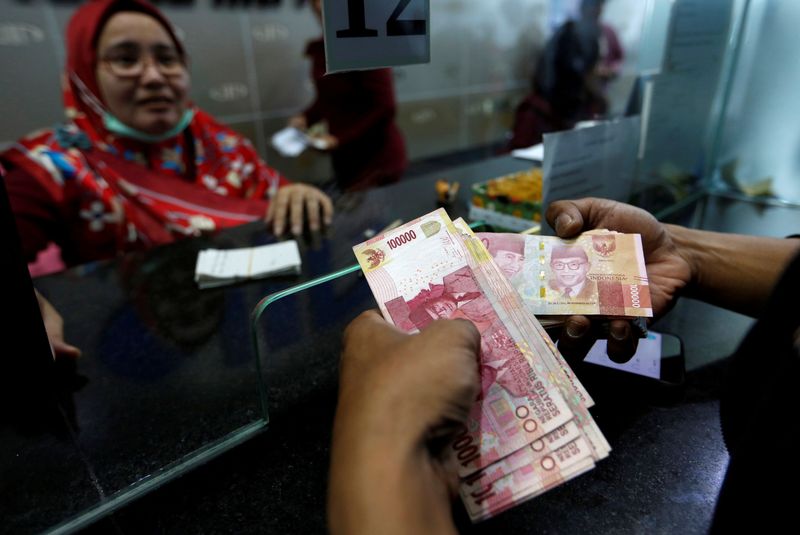By Karin Strohecker
LONDON (Reuters) - Many emerging markets emulated their developed peers this year with bond-buying programmes that successfully tamped down borrowing costs, yet unease is also stirring about the possible hit to hard-won monetary policy independence.
Quantitative easing (QE), until recently the preserve of advanced economies such as Japan or the United States, was adopted this year by more than a dozen emerging markets seeking to combat economic pain from the COVID-19 pandemic.
While some central banks including South Africa and India limited themselves to buying government debt in secondary trading, others such as Indonesia and Ghana launched themselves straight into primary markets, snapping up bonds as soon as they were issued.
Emerging market watchers such as David Hauner at BofA are broadly positive on the results.
"So far it has been a success in a sense that it has actually reduced borrowing costs in local currency for many emerging markets, reduced illiquidity in bad times and helped cap yields as well," Hauner said.
The coronavirus-led market rout hit developing economies hard, with more than $100 billion fleeing equity and bond markets, while currencies such as Indonesia's rupiah or South Africa's rand tumbled by between 15-21% in the first quarter.
Lately, both have recouped losses, standing around 4% down on the year.
Hauner, however, warns of the longer-term risk that governments get used to central banks underwriting their debt with bond-buying schemes.
"This reduces at some point the incentive to tackle fiscal deficits... basically monetary policy gets subordinated under fiscal policy needs, which is the old problem that emerging markets used to have before they introduced independent central banks and inflation targeting."
The issue is debated extensively in the developed world too but freedom to set monetary policy, free of political interference, may be especially vital in emerging markets, given a history of inflation and their need to lure foreign capital.
The concern is biggest for economies which have traditionally struggled with balance of payment deficits such as South Africa and Indonesia, but which also face rising debt levels. Emerging market debt-to-GDP hit nearly 250% in the July-September period.
Many emerging central banks also launched into QE whilst they still had room to cut interest rates - unlike in most of the developed world. For instance, Ghanaian and Turkish rates are around 15%, while rates in South Africa, India and Malaysia were above 6% when bond buying kicked off.
Graphic: EM central banks and asset buying programmes https://fingfx.thomsonreuters.com/gfx/mkt/bdwpkqqampm/EM%20central%20banks%20and%20asset%20buying%20programmes.PNG
Yet while QE in most developed countries brought down borrowing costs and flattened the yield curve, the same did not always happen in emerging markets.
Francois Savary, chief investment officer at Swiss wealth manager Prime Partners, said this shows markets took into account macroeconomic conditions in countries that were traditionally much less stable.
"Even if you have QE, people are still reluctant to consider that the long-term risks do not exist so there is still a premium for the uncertainties and sustainability of the fundamentals in the medium to the long term," he said.
Graphic: Indonesia and South Africa benchmark yield curves https://fingfx.thomsonreuters.com/gfx/mkt/jznpnqqmdvl/Indonesia%20and%20South%20Africa%20benchmark%20yield%20curves.PNG
Still, in a world of ultra-low interest rates, the pull of emerging markets is huge, and capital inflows have rebounded in recent months, hitting record highs in November. The world's biggest asset manager BlackRock (NYSE:BLK) predicts healthy gains in 2021 for the sector.
Investors appear "little bothered so far" by asset buying programmes in countries such as India, Indonesia and the Philippines, S&P Global (NYSE:SPGI) Ratings's Andrew Wood noted. But he also warned the lure of high yields might wear off.
"The relatively mild market impact of central bank purchases of government bonds in these countries could change if the institutions increased their purchases, or if investors no longer saw the buying as temporary," Wood said.
The International Monetary Fund also recently warned that large-scale, open-ended asset buying risked eroding institutional credibility and pressuring capital flows.
"These risks need to be weighed before central banks embark on a shift in their policies and their implementation," Dimitris Drakopoulos, a financial sector expert at the International Monetary Fund, said in a note.
